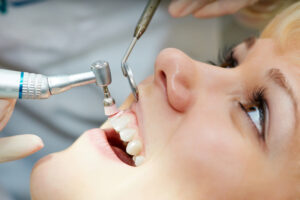Dental Hygiene

What is a Dental Hygienist and What Do They Do?
A dental hygienist helps you to improve and maintain your oral health by providing personalised preventative advice on topics such as oral hygiene and diet, as well as undertaking treatments like thorough full-mouth ‘scaling’ to remove biofilms and tenacious deposit which are compromising your gum health. – The hygienist can also spend time removing staining which may be discolouring your smile. – Occasionally, if you have gum disease or ‘periodontitis’, the hygienist may undertake gum treatment known as ‘root surface debridement’, which aims to help resolve your gum disease by deep cleaning specific teeth below the gum-line to help flush out the plaque bacteria irritating your gums.
Why should I Come to See the Hygienist?
Seeing the hygienist regularly is incredibly important for your gum and dental health; we can spend the time with you that the dentist doesn’t always have to ensure you have a thorough understanding of your oral health; answering any of your questions and discussing exactly which toothbrush or interdental aids will best suit your teeth to keep them healthy, as well as providing a thorough ‘clean’ or ‘scale’ so that you maintain a fresh, healthy smile.
How Often Should I See the Hygienist?
The dentist will usually advise you on how often they recommend you see the hygienist, however, depending on your level of gum disease or health, we normally suggest every 3, 6, or 12 months. – This is because it is essential to keep tabs on your gum health, which the hygienist can help you do by monitoring any changes and removing any plaque build up in-between your check-ups with the dentist
What Causes Gum Disease?
Our mouths are full of bacteria. These bacteria constantly form a sticky, colourless “plaque” on our teeth. Brushing and flossing will help to get rid of plaque. Plaque that is not removed can harden and form “tartar” that brushing cannot remove. Only a professional cleaning by a dentist or dental hygienist can remove tartar.
Are There Different Types of Gum Disease?
- Gingivitis
Gum Disease affects the supporting structures of the teeth. The longer plaque and tartar remain on the teeth, the more harmful they become. The bacteria cause inflammation of the gums, this is called Gingivitis. In Gingivitis, the gums become red, swollen and can bleed easily. Gingivitis is a mild form of gum disease that can usually be reversed with daily brushing and flossing, and regular cleaning by a dental hygienist. - Periodontal Disease
When Gingivitis is not treated, it can advance to Periodontitis (periodontal disease). In Periodontitis, gums pull away from the teeth and form spaces (called “pockets”) that become infected. If ignored or untreated, the bones, gums, and tissue that support the teeth are destroyed. The teeth may eventually become loose and have to be removed.
Who Gets Gum Disease?
It is estimated that gum disease affects more than half of all adults in the UK to some degree and most people experience it at least once. It is much less common in children however. There are also some factors that may make you more susceptible to gum disease
Smoking
Need another reason to quit smoking? Smoking is one of the most significant risk factors associated with the development of gum disease. Also, smoking can lower the chances of successful treatment.
Hormonal Changes in Girls / Women
These changes can make gums more sensitive and make it easier for gingivitis to develop.
Diabetes
People with diabetes are at higher risk of developing infections, including gum disease.
Other Illnesses and Their Treatments
Diseases such as AIDS and its treatments can also negatively affect the health of gums, as can treatments for cancer.
Medications
There are hundreds of prescription and over the counter medications that can reduce the flow of saliva, which has a protective effect on the mouth. Without enough saliva, the mouth is vulnerable to infections such as gum disease.
Genetic Susceptibility
Some people are just more prone to severe gum disease than others due to genetic predisposition.
How is gum disease treated?
Our hygienist or Dentist will customise your treatment plan and discuss with you the type and extent of treatment that you may need. The main goals of treatment are to control the infection and ensure you are confident implementing an effective home care routine. Any type of treatment requires that the patient keep up good oral hygiene routine at home.
How can I keep my teeth and gums healthy?
- Brush your teeth twice a day with a fluoride toothpaste and electric toothbrush.
- Floss / use inter-dental brushes regularly to remove plaque from between teeth.
- Visit the dentist routinely for a check-up
- Visit the hygienist routinely for professional cleanings
- Eat a well balanced diet
- Don’t smoke
Why Cant my Dentist Clean my Teeth Instead of the Hygienist?
Dental Hygienists are specially trained to look after gums specifically. Thorough cleanings play a major role in maintaining healthy gums and teeth. Hygienists are also specially trained to provide tailored advice to patients to ensure they can have an effective home care routine. As the hygienist’s main focus is maintaining healthy gums they will have the opportunity to provide you with specific treatment, individual advice and a high standard of clinical care.
Meet the Dental Hygienist

Kaitlin
GDC 297235
Kaitlin graduated with honours from The University of Birmingham, and was awarded with the prize for academic excellence two years running for coming the top of the year.
Kaitlin loves practicing the full scope of practice, as both a dental hygienist and therapist.
As a dental hygienist, Kaitlin is keen to work with patients to achieve gum health and maintain their motivation to keep their gums and teeth healthy, and ultimately give patients that big confidence boost that a clean and healthy smile always provides.
As a clinician, Kaitlin has a calm and open approach with appointments. By coming to visit Somers Square Dental, Kaitlin work’s with patients to explain in detail what is influencing their gum disease level and give personalised preventative advice to help you get control of your oral health.
Kaitlin likes to ensure patients feel comfortable and at ease in their appointments, and wants them to feel they have a say in their care plan.
Outside of work, Kaitlin enjoys swimming and running to keep active.
Accreditations / Associations
Somers Square Dental Practice are proud to be accredited by and associated with the following endorsements:







